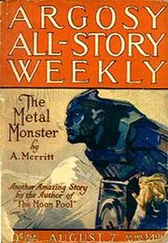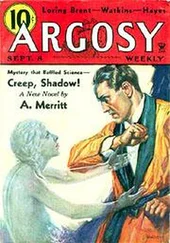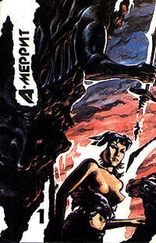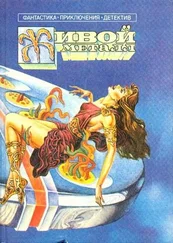Абрахам Меррит - Burn, Witch, Burn!
Здесь есть возможность читать онлайн «Абрахам Меррит - Burn, Witch, Burn!» весь текст электронной книги совершенно бесплатно (целиком полную версию без сокращений). В некоторых случаях можно слушать аудио, скачать через торрент в формате fb2 и присутствует краткое содержание. Год выпуска: 1932, Жанр: Ужасы и Мистика, на английском языке. Описание произведения, (предисловие) а так же отзывы посетителей доступны на портале библиотеки ЛибКат.
- Название:Burn, Witch, Burn!
- Автор:
- Жанр:
- Год:1932
- ISBN:нет данных
- Рейтинг книги:4 / 5. Голосов: 1
-
Избранное:Добавить в избранное
- Отзывы:
-
Ваша оценка:
- 80
- 1
- 2
- 3
- 4
- 5
Burn, Witch, Burn!: краткое содержание, описание и аннотация
Предлагаем к чтению аннотацию, описание, краткое содержание или предисловие (зависит от того, что написал сам автор книги «Burn, Witch, Burn!»). Если вы не нашли необходимую информацию о книге — напишите в комментариях, мы постараемся отыскать её.
Burn, Witch, Burn! — читать онлайн бесплатно полную книгу (весь текст) целиком
Ниже представлен текст книги, разбитый по страницам. Система сохранения места последней прочитанной страницы, позволяет с удобством читать онлайн бесплатно книгу «Burn, Witch, Burn!», без необходимости каждый раз заново искать на чём Вы остановились. Поставьте закладку, и сможете в любой момент перейти на страницу, на которой закончили чтение.
Интервал:
Закладка:
At that the spell of nightmare dropped from me; for the first time in hours I was on ground that I knew. It
was the rigor mortis, the stiffening of death-but setting in more quickly and proceeding at a rate I had
never known.
I stepped forward and drew the lids down over the glaring eyes. I covered the dreadful face.
I looked at Ricori. He was still on his knees, crossing himself and praying. And kneeling beside him, arm
around his shoulders, was Nurse Walters, and she, too, was praying.
Somewhere a clock struck five.
CHAPTER II: THE QUESTIONNAIRE
I offered to go home with Ricori, and somewhat to my surprise he accepted with alacrity. The man was
pitiably shaken. We rode silently, the tight-lipped gunmen alert. Peters' face kept floating before me.
I gave Ricori a strong sedative, and left him sleeping, his men on guard. I had told him that I meant to
make a complete autopsy.
Returning to the hospital in his car, I found the body of Peters had been taken to the mortuary. Rigor
mortis, Braile told me, had been complete in less than an hour-an astonishingly short time. I made the
necessary arrangements for the autopsy, and took Braile home with me to snatch a few hours sleep. It is
difficult to convey by words the peculiarly unpleasant impression the whole occurrence had made upon
me. I can only say that I was as grateful for Braile's company as he seemed to be for mine.
When I awoke, the nightmarish oppression still lingered, though not so strongly. It was about two when
we began the autopsy. I lifted the sheet from Peters' body with noticeable hesitation. I stared at his face
with amazement. All diabolism had been wiped away. It was serene, unlined-the face of a man who had
died peacefully, with no agony either of body or mind. I lifted his hand, it was limp, the whole body
flaccid, the rigor gone.
It was then, I think, that I first felt full conviction I was dealing with an entirely new, or at least unknown,
agency of death, whether microbic or otherwise. As a rule, rigor does not set in for sixteen to twenty-four
hours, depending upon the condition of the patient before death, temperature and a dozen other things.
Normally, it does not disappear for forty-eight to seventy-two hours. Usually a rapid setting-in of the
stiffening means as rapid a disappearance, and vice versa. Diabetics stiffen quicker than others. A sudden
brain injury, like shooting, is even swifter. In this case, the rigor had begun instantaneously with death,
and must have completed its cycle in the astonishingly short time of less than five hours-for the attendant
told me that he had examined the body about ten o'clock and he had thought that stiffening had not yet
set in. As a matter of fact, it had come and gone.
The results of the autopsy can be told in two sentences. There was no ascertainable reason why Peters
should not be alive. And he was dead!
Later, when Hoskins made his reports, both of these utterly conflicting statements continued to be true.
There was no reason why Peters should be dead. Yet dead he was. If the enigmatic lights we had
observed had anything to do with his death, they left no traces. His organs were perfect, all else as it
should have been; he was, indeed, an extraordinarily healthy specimen. Nor had Hoskins been able to
capture any more of the light-carrying corpuscles after I had left him.
That night I framed a short letter describing briefly the symptoms observed in Peters' case, not dwelling
upon the changes in expression but referring cautiously to "unusual grimaces" and a "look of intense fear."
Braile and I had this manifold and mailed to every physician in Greater New York. I personally attended
to a quiet inquiry to the same effect among the hospitals. The letters asked if the physicians had treated
any patients with similar symptoms, and if so to give particulars, names, addresses, occupations and any
characteristic interest under seal, of course, of professional confidence. I flattered myself that my
reputation was such that none of those who received the questionnaires would think the request actuated
either by idle curiosity or slightest unethical motive.
I received in response seven letters and a personal visit from the writer of one of them. Each letter,
except one, gave me in various degrees of medical conservatism, the information I had asked. After
reading them, there was no question that within six months seven persons of oddly dissimilar
characteristics and stations in life had died as had Peters.
Chronologically, the cases were as follows:
May 25: Ruth Bailey, spinster; fifty years old; moderately wealthy; Social Registerite and best of
reputation; charitable and devoted to children. June 20: Patrick McIlraine; bricklayer; wife and two
children. August 1: Anita Green; child of eleven; parents in moderate circumstances and well educated.
August 15: Steve Standish; acrobat; thirty; wife and three children. August 30: John J. Marshall; banker;
sixty interested in child welfare. September 10: Phineas Dimott; thirty-five; trapeze performer; wife and
small child. October 12: Hortense Darnley; about thirty; no occupation.
Their addresses, except two, were widely scattered throughout the city.
Each of the letters noted the sudden onset of rigor mortis and its rapid passing. Each of them gave the
time of death following the initial seizure as approximately five hours. Five of them referred to the
changing expressions which had so troubled me; in the guarded way they did it I read the bewilderment
of the writers.
"Patient's eyes remained open," recorded the physician in charge of the spinster Bailey. "Staring, but gave
no sign of recognition of surroundings and failed to focus upon or present any evidence of seeing objects
held before them. Expression one of intense terror, giving away toward death to others peculiarly
disquieting to observer. The latter intensified after death ensued. Rigor mortis complete and dissipated
within five hours."
The physician in charge of McIlraine, the bricklayer, had nothing to say about the ante-mortem
phenomena, but wrote at some length about the expression of his patient's face after death.
"It had," he reported, "nothing in common with the muscular contraction of the so-called 'Hippocratic
countenance,' nor was it in any way the staring eyes and contorted mouth familiarly known as the death
grin. There was no suggestion of agony, after the death-rather the opposite. I would term the expression
one of unusual malice."
The report of the physician who had attended Standish, the acrobat, was perfunctory, but it mentioned
that "after patient had apparently died, singularly disagreeable sounds emanated from his throat." I
wondered whether these had been the same demonic machinations that had come from Peters, and, if so,
I could not wonder at all at my correspondent's reticence concerning them.
I knew the physician who had attended the banker-opinionated, pompous, a perfect doctor of the very
rich.
"There can be no mystery as to the cause of death," he wrote. "It was certainly thrombosis, a clot
somewhere in the brain. I attach no importance whatever to the facial grimaces, nor to the time element
involved in the rigor. You know, my dear Lowell," he added, patronizingly, "it is an axiom in forensic
medicine that one can prove anything by rigor mortis."
I would have liked to have replied that when in doubt thrombosis as a diagnosis is equally as useful in
covering the ignorance of practitioners, but it would not have punctured his complacency.
Читать дальшеИнтервал:
Закладка:
Похожие книги на «Burn, Witch, Burn!»
Представляем Вашему вниманию похожие книги на «Burn, Witch, Burn!» списком для выбора. Мы отобрали схожую по названию и смыслу литературу в надежде предоставить читателям больше вариантов отыскать новые, интересные, ещё непрочитанные произведения.
Обсуждение, отзывы о книге «Burn, Witch, Burn!» и просто собственные мнения читателей. Оставьте ваши комментарии, напишите, что Вы думаете о произведении, его смысле или главных героях. Укажите что конкретно понравилось, а что нет, и почему Вы так считаете.

![Абрахам Меррит - Лунный бассейн [Лунная заводь]](/books/20623/abraham-merrit-lunnyj-bassejn-lunnaya-zavod-thumb.webp)









